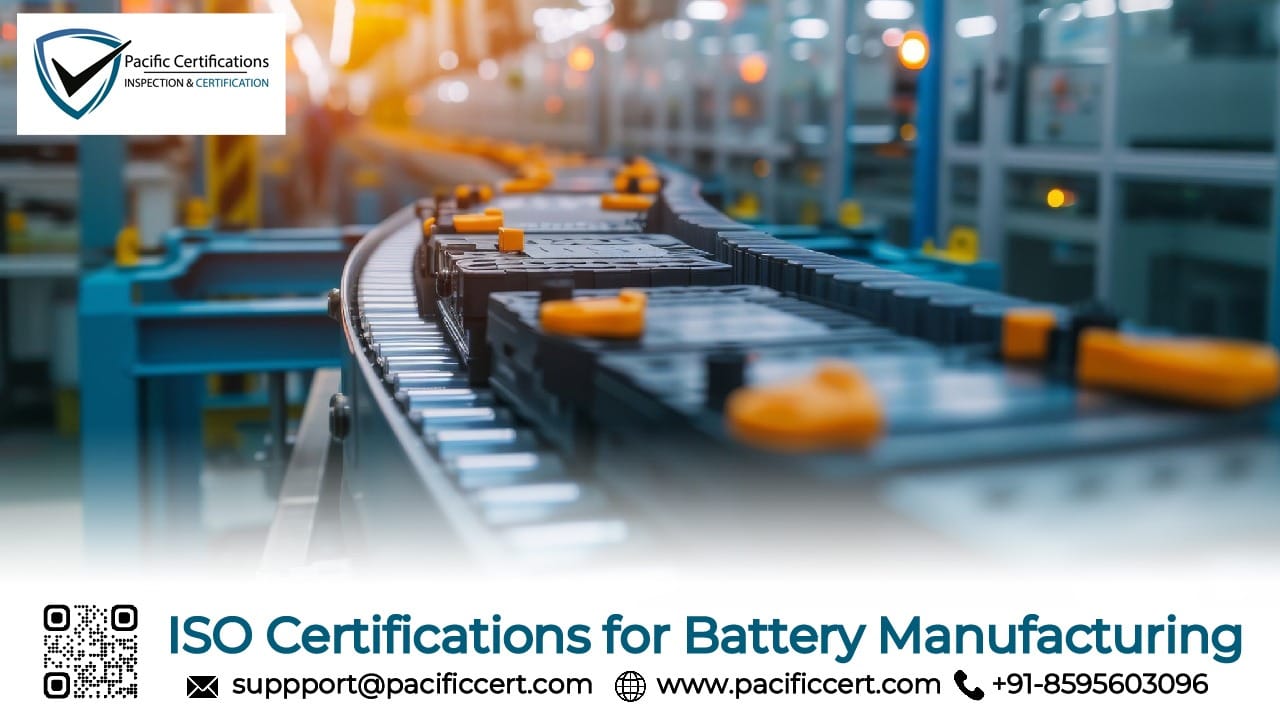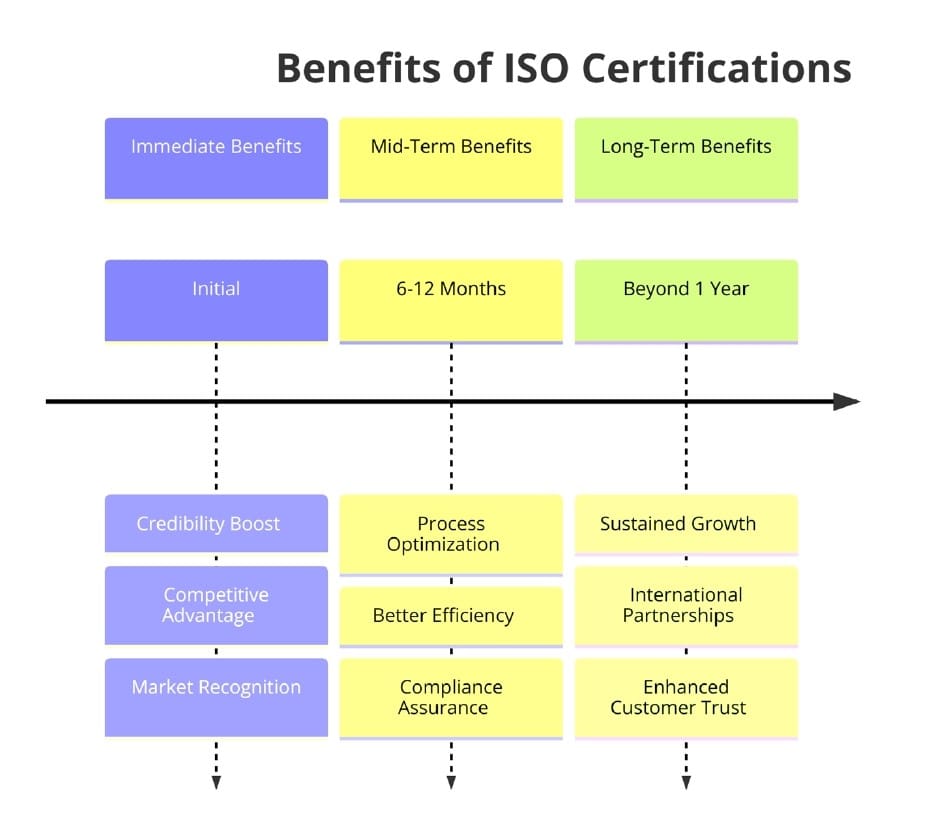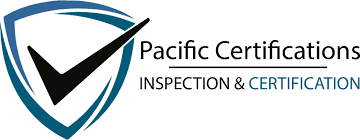ISO Certifications for Battery Manufacturing Businesses, Requirements and Benefits

Introduction to ISO Standards for Battery Manufacturing
Battery manufacturing is one of the fastest-growing industries globally, fueled by electric vehicles (EVs), renewable energy storage, and consumer electronics. The global battery market is projected to surpass USD 150 billion by 2030, with lithium-ion batteries dominating growth due to EV adoption and grid-scale storage solutions.
However, the sector faces strict safety and quality requirements. Fire hazards, hazardous chemicals, and environmental impacts make compliance with international standards essential. ISO certifications provide battery manufacturers with structured frameworks to ensure quality, safety, reduce environmental impact, and meet the expectations of regulators and global supply chains.
As the demand for electric vehicles (EVs), renewable energy storage, and portable devices continues to soar, adopting ISO standards has become a necessity for manufacturers aiming to stand out in this evolving industry.
In battery manufacturing, safety, performance, and sustainability are critical to meeting global demand for clean energy and reliable power solutions.
If you need ISO certification for Battery Manufacturing business, our expert team at Pacific Certifications is here to assist. Contact us via email at [email protected] or call us at +91-8595603096 today!
Applicable ISO Standards for Battery Manufacturing
Several ISO standards apply specifically to battery manufacturing, addressing everything from quality management to environmental impact and safety. Below is an overview of key ISO standards:
Standard | Focus Area | Relevance |
|---|---|---|
ISO 9001:2015 | Quality Management | Ensures consistent production quality and customer satisfaction. |
ISO 14001:2015 | Environmental Management | Reduces emissions, waste, and environmental risks in manufacturing. |
ISO 45001:2018 | Occupational Health & Safety | Protects workers from chemical and physical hazards in battery plants. |
ISO 50001:2018 | Energy Management | Improves energy efficiency in power-intensive battery production. |
ISO 26262 | Functional Safety (Automotive) | Ensures safety of batteries used in electric and hybrid vehicles. |
ISO/IEC 27001:2022 | Information Security | Protects design data, R&D, and connected battery technologies. |
ISO 15118 / ISO 12405 | Electric Vehicles & Testing | Standards specific to charging communication and battery system testing. |
ISO 22301:2019 | Business Continuity | Supports resilience in case of supply chain disruptions or safety incidents. |
ISO 9001:2015 Quality Management Systems
ISO 9001 sets the framework for consistent quality assurance in production processes. For battery manufacturers, this standard ensures that products meet customer expectations, adhere to industry regulations, and improve operational efficiency.
ISO 14001:2015 Environmental Management Systems
This standard focuses on minimizing environmental impact. It is crucial for battery manufacturers who deal with potentially hazardous materials and aim to adopt eco-friendly practices.
ISO 45001: Occupational Health and Safety
Battery manufacturing involves risks related to chemical handling and high temperatures. ISO 45001 ensures safe working conditions by identifying and managing occupational hazards.
ISO 26262: Functional Safety for Road Vehicles
For battery manufacturers catering to the automotive sector, ISO 26262 is critical. It emphasizes functional safety in electric and hybrid vehicles, ensuring that batteries and related components meet stringent safety requirements.
ISO 50001: Energy Management Systems
This standard helps battery manufacturers optimize energy consumption, reducing costs and aligning with sustainability goals. It is particularly relevant for manufacturers aiming to reduce their carbon footprint.
ISO 17025: Testing and Calibration Laboratories
Battery manufacturers often rely on in-house or third-party laboratories for testing. ISO 17025 ensures the accuracy and reliability of these tests, reinforcing trust in product performance and safety.
ISO 27001: Information Security Management Systems
With the rise of smart batteries integrated with IoT (Internet of Things) technology, ISO 27001 safeguards sensitive data, preventing breaches and cyber threats.
ISO/IEC 17020 and ISO/IEC 17065
These standards govern conformity assessments and product certifications. They are essential for manufacturers seeking third-party validation of their processes and products.
Click here to find out more applicable standards to your industry
At Pacific Certifications, we specialize in auditing and issuing ISO certifications for battery manufacturing companies. Our services are designed to simplify your certification journey. Enhance your operations with ISO certification for Battery Manufacturing. Contact us at Pacific Certifications by emailing [email protected] or calling +91-8595603096.
What are the requirements of ISO Certifications for Battery Manufacturing?
Each ISO standard applicable to battery manufacturing has specific requirements to ensure quality, safety, sustainability, and efficiency. Below is a breakdown of the requirements for key ISO standards relevant to this industry:
ISO 9001: Quality Management Systems (QMS) Requirements
The ISO 9001 standard provides a framework for consistent quality management. Its key requirements include:
- Establishment of a QMS: Develop a structured quality management system tailored to battery manufacturing processes.
- Documentation: Maintain records of quality policies, objectives, and operational processes.
- Customer Focus: Ensure that all products meet customer expectations and comply with regulatory requirements.
- Process Approach: Identify and manage interrelated processes for efficient operations.
- Risk-Based Thinking: Analyze and address risks and opportunities that could impact quality.
- Internal Audits: Conduct regular audits to evaluate the performance of the QMS and ensure compliance.
- Continual Improvement: Implement strategies to enhance process efficiency and product quality.
ISO 14001: Environmental Management Systems (EMS) Requirements
ISO 14001 focuses on minimizing the environmental footprint of battery manufacturing. Key requirements include:
- Environmental Policy: Develop and communicate an environmental policy aligned with sustainability goals.
- Environmental Impact Assessment: Identify and evaluate the environmental aspects of manufacturing activities.
- Compliance Obligations: Ensure adherence to environmental regulations and legal requirements.
- Lifecycle Perspective: Address environmental impact at all stages, from raw material sourcing to disposal.
- Objectives and Targets: Set measurable environmental goals, such as reducing emissions or waste.
- Operational Controls: Implement procedures to manage hazardous materials and prevent environmental harm.
- Monitoring and Measurement: Regularly track environmental performance and adjust practices as needed.
ISO 45001: Occupational Health and Safety (OHS) Requirements
ISO 45001 ensures the safety and well-being of employees in potentially hazardous manufacturing environments. Its key requirements include:
- Hazard Identification: Identify risks related to chemical handling, machinery, and workplace ergonomics.
- Risk Assessment and Mitigation: Develop and implement measures to minimize identified risks.
- Employee Training: Provide safety training tailored to specific manufacturing roles.
- Incident Reporting: Establish systems for reporting and investigating workplace incidents.
- Emergency Preparedness: Create plans for responding to emergencies like chemical spills or fires.
- Continual Improvement: Regularly evaluate and improve safety measures.
ISO 26262: Functional Safety for Road Vehicles Requirements
Battery manufacturers catering to the automotive industry must meet ISO 26262 requirements, which ensure safety in electric and hybrid vehicles. Key requirements include:
- Hazard Analysis and Risk Assessment: Identify potential safety issues in battery systems and evaluate their severity.
- Safety Lifecycle: Integrate safety considerations throughout the product development lifecycle.
- Validation and Verification: Test batteries to confirm that safety requirements are met.
- Management of Functional Safety: Establish a safety culture and assign responsibilities for safety management.
- Compliance Documentation: Maintain comprehensive records of safety measures and testing.
ISO 50001: Energy Management Systems (EnMS) Requirements
ISO 50001 helps battery manufacturers optimize energy use. Its primary requirements include:
- Energy Policy: Define an energy policy focused on efficiency and sustainability.
- Energy Planning: Analyze energy consumption patterns and identify opportunities for improvement.
- Energy Performance Indicators (EnPIs): Establish metrics to measure and track energy efficiency.
- Operational Controls: Implement practices to minimize energy waste.
- Monitoring and Auditing: Regularly assess energy performance and adjust operations as necessary.
- Employee Awareness: Train staff on energy-saving techniques and promote a culture of sustainability.
ISO 17025: Testing and Calibration Laboratories Requirements
Battery manufacturers with in-house or third-party labs must meet ISO 17025 requirements to ensure testing reliability. These include:
- Competence of Personnel: Ensure staff conducting tests are qualified and trained.
- Accredited Testing Methods: Use standardized and validated testing methods for batteries.
- Equipment Calibration: Regularly calibrate testing equipment to maintain accuracy.
- Quality Control: Implement procedures to verify the validity of test results.
- Documentation: Maintain detailed records of testing processes and results.
ISO 27001: Information Security Management Systems (ISMS) Requirements
Smart batteries and IoT integration make ISO 27001 essential for protecting sensitive data. Key requirements include:
- Risk Assessment: Identify potential cybersecurity threats to battery systems and operations.
- Access Control: Limit access to critical information to authorized personnel only.
- Incident Response: Develop procedures for responding to data breaches or cyberattacks.
- Training and Awareness: Educate employees on best practices for cybersecurity.
- Regular Audits: Evaluate the ISMS periodically to ensure its effectiveness.
ISO/IEC 17020 and ISO/IEC 17065: Conformity Assessment and Certification Requirements
These standards ensure the impartiality and competence of bodies assessing battery manufacturing conformity. Key requirements include:
- Impartiality: Certification bodies must avoid conflicts of interest during assessments.
- Competence: Use qualified personnel and validated methods for conformity assessments.
- Transparency: Provide clear documentation and communication of assessment results.
- Traceability: Maintain records of all certification activities for accountability.
Tip: Start with ISO 9001 and ISO 14001 for quality and sustainability, then integrate ISO 45001 and ISO 26262 to address worker safety and automotive battery compliance.
What are the benefits of ISO Certifications for Battery Manufacturing?
ISO certification enhances product reliability, regulatory compliance, and competitiveness in the global supply chain. Below are the key benefits:

- Improved product safety, reducing risks of overheating, fire, or chemical leaks.
- Stronger compliance with international environmental and safety regulations.
- Increased trust from automotive, electronics, and renewable energy clients.
- Greater efficiency through reduced defects and standardized processes.
- Safer working conditions for employees exposed to hazardous materials.
- Better access to global markets where certification is a supplier requirement.
- Reduced environmental footprint, supporting sustainability commitments.
The global battery industry is accelerating rapidly, with demand for lithium-ion batteries projected to grow at over 19% CAGR through 2032. EV adoption is the primary driver: by 2030, electric vehicles are expected to account for 60% of new car sales in leading markets, pushing unprecedented demand for safe and efficient batteries.
Sustainability is another major trend. Governments and investors are pressuring manufacturers to address carbon footprints, recycling practices, and responsible sourcing of raw materials like cobalt and lithium. Safety remains a top priority, as incidents of battery fires in EVs and consumer electronics continue to attract regulatory scrutiny.
In this context, ISO certifications play a vital role, ISO 9001 and ISO 26262 support automotive compliance, ISO 14001 and ISO 50001 address sustainability, while ISO 22301 ensures resilience in complex supply chains. Certifications are becoming both a regulatory expectation and a market differentiator for global battery manufacturers.
Contact Us
Pacific Certifications, accredited by ABIS, provides independent audit and certification services for ISO standards relevant to the battery industry. Our services help manufacturers align with international best practices, meet OEM requirements, and demonstrate compliance in global markets. Contact us at [email protected] or +91-8595603096.
Ready to get ISO certified?
Contact Pacific Certifications to begin your certification journey today!
Author: Sony
Suggested Certifications –
Read more: Pacific Blogs

